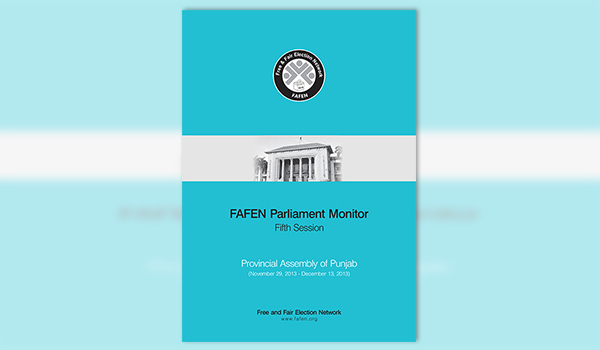 Some positive steps were taken to enhance citizen’s access to information in the Punjab Assembly in addition to amendments to existing laws during the fifth session. The session was otherwise marked by low interest of members in terms of attendance and participation, says Free and Fair Election Network in its session report based on the direct observation of the session.
Some positive steps were taken to enhance citizen’s access to information in the Punjab Assembly in addition to amendments to existing laws during the fifth session. The session was otherwise marked by low interest of members in terms of attendance and participation, says Free and Fair Election Network in its session report based on the direct observation of the session.
The Punjab Transparency and Right to Information Bill 2013, which mandates government departments to ensure the provision of information to the citizens was passed in addition to ten amendments to existing laws.
In anticipation of the upcoming local government elections, four ordinances amended the Local Government Act passed by the House in August (2013). The amendments allow election of members of local governments through secret ballot on the basis of adult franchise “in such manner as may be prescribed” and also decrees that no court, officer or authority can review or correct delimitation once the election schedule has been notified.
Muslims are to submit to declaration to the returning officer that is given in Ninth Schedule along with the nomination papers.
Additionally, other bills/ordinances sought amendments in existing laws pertaining to social security and benefits of provincial employees, increasing penalties for breach of minimum wage laws, as well as redefining key terms in law related to weights and measures used in markets during buying and selling.
The adopted resolutions dealt with the protection of Quranic verses printed in newspapers, lowering the price of cement, controlling the contamination of drainage system in Faisalabad, attack on Express Tribune’s office in Karachi, granting university status to College of Veterinary and Animal Sciences in Jhang, encroachments at a mausoleum, increasing employment quota for special people, urging the UN to take action against Bangladesh for giving punishment to JI leaders and paying tribute to Nelson Mandela.
Lawmakers sought response from relevant ministries on nine of ten calling attention notices, all related to law and order issues in the province.
dditionally, 54 MPAs performed government oversight through 247 starred questions (requiring oral response). The majority of starred questions were on education and health related matters. However 40% (101 questions) were taken up on the floor while the House left 146 questions unaddressed. Most of the questions were submitted by the MPAs of the ruling party PML-N, followed by the leading opposition party – PTI.
The House held a 193 minute debate (8% of session time) on law and order in the country. Nineteen legislators – PML-N (nine), PTI (seven) and one each of PPPP, JI and Independent – expressed their views in the general discussion.
As many as 90 adjournment motions were tabled during the session, of them 76 were disposed of, 13 were kept pending and only one motion, on the functioning of dental department of PMC Faisalabad got the ruling of the Chair.
Members raised 52 points of order which consumed an hour and 12 minutes of the proceedings. The Chair directed four questions of privilege, sponsored by PML-N lawmakers against various public officials, to the concerned committee. Low attendance was observed throughout the session as on average only 16 % MPAs(59 of the total membership – 370) were present at the start of a sitting, 61 MPAs (16% MPAs) at the adjournment while a maximum 117 MPAs (32%) attended the session. The lack of quorum observed on various occasions was pointed out eight times by the opposition members – PTI (seven), PML (once).
The attendance and interest of key members was also low as the Chief Minister did not attend a single sitting throughout the session, whereas the Leader of Opposition was present for 55% of the session’s time. Speaker was present in six sittings and presided over 37% of the session’s time while 61% of the proceedings were chaired by the Deputy Speaker.
FAFEN observes lawmakers participation against three categories; MPAs who only submit or debate agenda and those who do both. Participation of members was observed to be very low as on average 72% (267 MPAs) did not participate during the session. The participating members appeared more interested in submitting agenda than speaking in the on-floor debates as 11% submitted business, 8% debated it while 9% did both.
The session witnessed seven walkouts consuming 11 hours and nine minutes – 28% of the session time. Four walkouts were staged by the entire opposition over disregarding the US drone attacks related agenda, nonconsideration of amendments proposed by the opposition in Local Government bill (four government sponsored amendments were passed during the session), and dismissal of chairman of NADRA.
Starting from November 29, 2013 to December 13, 2013, the fifth session lasted 39 hours and 42 minutes. Each sitting, on average, met for three hours and 36 minutes with a delay of an hour and 38 minutes. The House adopted nine of 14 resolutions on the agenda.
FAFEN hopes this report will be a valuable contribution to creating both a more informed citizenry and an increasingly responsible legislative body.
For complete report click here








